-
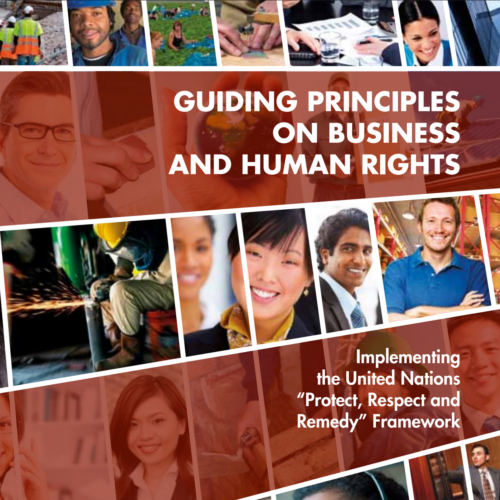 The Guiding Principles seek to provide an authoritative global standard for preventing and addressing the risk of adverse human rights impacts linked to business activity. See The Corporate Responsibility to Respect Human Rights which is the official guidance to support effective implementation of the Guiding Principles.
The Guiding Principles seek to provide an authoritative global standard for preventing and addressing the risk of adverse human rights impacts linked to business activity. See The Corporate Responsibility to Respect Human Rights which is the official guidance to support effective implementation of the Guiding Principles. -
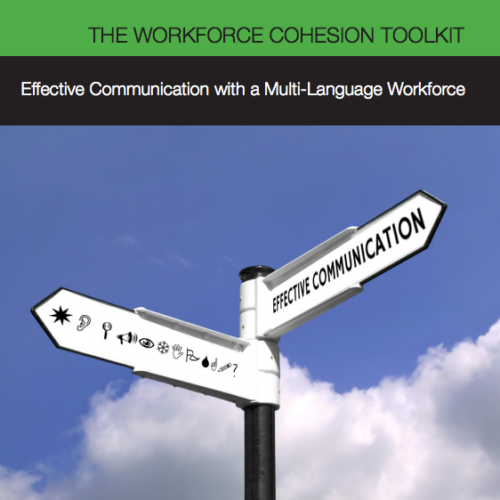 Stronger Together is a multi-stakeholder initiative which aims to reduce modern slavery. It provides guidance, training and resources to organisations, employers, labour providers, workers and their representatives. This free collection of resources includes pragmatic guidance and toolkits, and resources for the workplace including multilingual posters, leaflets and template policies. This Toolkit is intended to provide practical guidance and advice to managers on how to communicate with their workforce where more than one language is spoken. The guide is not intended to be a definitive guide, but rather gathers together advice to provide insight on how companies have successfully navigated communications issues. It includes both tips on language use and on understanding cultural difference, and illustrates practical advice through the use of case studies.
Stronger Together is a multi-stakeholder initiative which aims to reduce modern slavery. It provides guidance, training and resources to organisations, employers, labour providers, workers and their representatives. This free collection of resources includes pragmatic guidance and toolkits, and resources for the workplace including multilingual posters, leaflets and template policies. This Toolkit is intended to provide practical guidance and advice to managers on how to communicate with their workforce where more than one language is spoken. The guide is not intended to be a definitive guide, but rather gathers together advice to provide insight on how companies have successfully navigated communications issues. It includes both tips on language use and on understanding cultural difference, and illustrates practical advice through the use of case studies.Credit: ALP, The Co-operative Food, Poultec,Workforce Cohesion Alliance - shared by Stronger Together
-
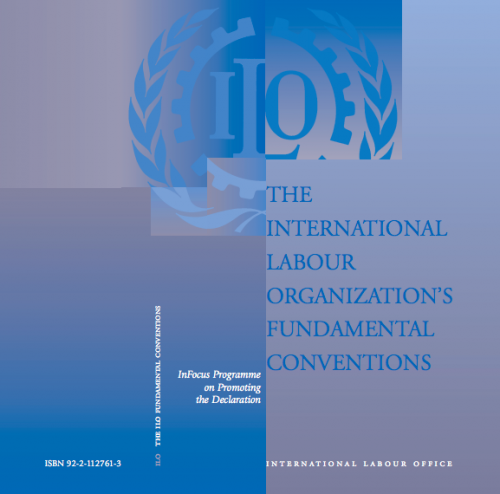 The ILO is the UN organisation responsible for setting and monitoring international labour standards. The ILO has identified eight conventions covering subjects they consider to be fundamental principles and rights at work. These are at times referred to as the core labour standards: ● Freedom of Association and Protection of the Right to Organise Convention, 1948 (No. 87) ● Right to Organise and Collective Bargaining Convention,1949 (No. 98) ● Forced Labour Convention, 1930 (No. 29) ● Abolition of Forced Labour Convention, 1957 (No. 105) ● Minimum Age Convention, 1973 (No. 138) ● Worst Forms of Child Labour Convention, 1999 (No. 182) ● Equal Remuneration Convention, 1951 (No. 100) ● Discrimination (Employment and Occupation) Convention, 1958 (No. 111)
The ILO is the UN organisation responsible for setting and monitoring international labour standards. The ILO has identified eight conventions covering subjects they consider to be fundamental principles and rights at work. These are at times referred to as the core labour standards: ● Freedom of Association and Protection of the Right to Organise Convention, 1948 (No. 87) ● Right to Organise and Collective Bargaining Convention,1949 (No. 98) ● Forced Labour Convention, 1930 (No. 29) ● Abolition of Forced Labour Convention, 1957 (No. 105) ● Minimum Age Convention, 1973 (No. 138) ● Worst Forms of Child Labour Convention, 1999 (No. 182) ● Equal Remuneration Convention, 1951 (No. 100) ● Discrimination (Employment and Occupation) Convention, 1958 (No. 111)Credit: Copyright © International Labour Organization, 2002
-
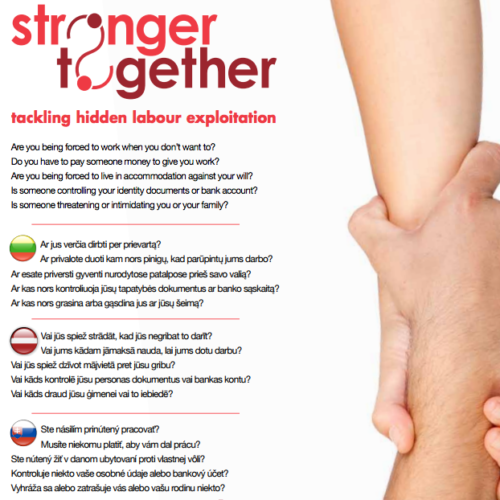 Stronger Together is a multi-stakeholder initiative which aims to reduce modern slavery. It provides guidance, training and resources to organisations, employers, labour providers, workers and their representatives. This free collection of resources includes pragmatic guidance and toolkits, and resources for the workplace including multilingual posters, leaflets and template policies. This poster is intended for the workplace, and asks employees five basic questions to raise awareness of exploitation and encourage those who may be unwittingly exploited to report their abuse. It is published in four different languages which can be chosen from a range of combinations.
Stronger Together is a multi-stakeholder initiative which aims to reduce modern slavery. It provides guidance, training and resources to organisations, employers, labour providers, workers and their representatives. This free collection of resources includes pragmatic guidance and toolkits, and resources for the workplace including multilingual posters, leaflets and template policies. This poster is intended for the workplace, and asks employees five basic questions to raise awareness of exploitation and encourage those who may be unwittingly exploited to report their abuse. It is published in four different languages which can be chosen from a range of combinations.Credit: Stronger Together
-
 The ILO is a UN organisation responsible for setting and monitoring international labour standards. This ILO paper includes an introduction and background to the context of labour recruitment in a period of increased global mobility, and details existing international and national labour standards to regulate recruitment of workers. It includes examples from the UK.
The ILO is a UN organisation responsible for setting and monitoring international labour standards. This ILO paper includes an introduction and background to the context of labour recruitment in a period of increased global mobility, and details existing international and national labour standards to regulate recruitment of workers. It includes examples from the UK.Credit: International Labour Organisation (ILO)
-
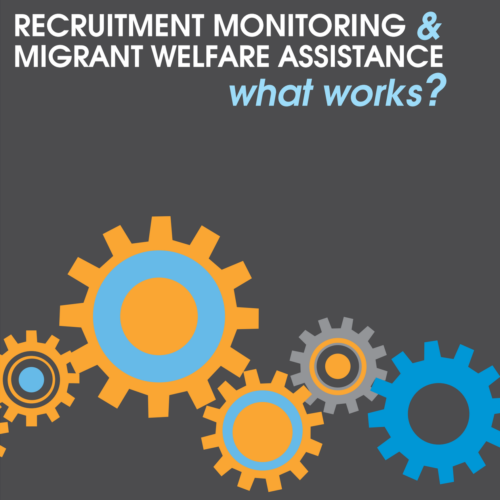 The IOM is a UN organisation providing advice and services to governments and migrants. This report focuses on the migrant welfare assistance currently offered to members of the Colombo Process group in countries of destination. It reviews provisions currently in place to prevent abusive recruitment practices and includes a proposed framework for measuring the effectiveness of recruitment monitoring.
The IOM is a UN organisation providing advice and services to governments and migrants. This report focuses on the migrant welfare assistance currently offered to members of the Colombo Process group in countries of destination. It reviews provisions currently in place to prevent abusive recruitment practices and includes a proposed framework for measuring the effectiveness of recruitment monitoring.Credit: International Organisation for Migration (IOM)
-
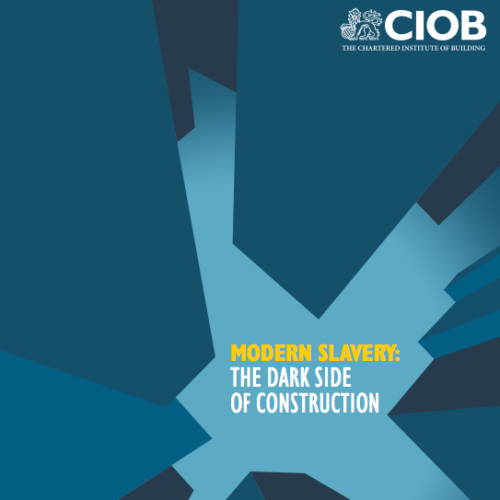 The Chartered Institute of Building published this report to shed light on exploitation within the construction industry. The report looks at labour exploitation all over the world considering the different types of exploitation in the industry, and offering recommendations to develop effective frameworks that will help protect human rights in the industry.
The Chartered Institute of Building published this report to shed light on exploitation within the construction industry. The report looks at labour exploitation all over the world considering the different types of exploitation in the industry, and offering recommendations to develop effective frameworks that will help protect human rights in the industry.Credit: Chartered Institute of Building (CIOB)
-
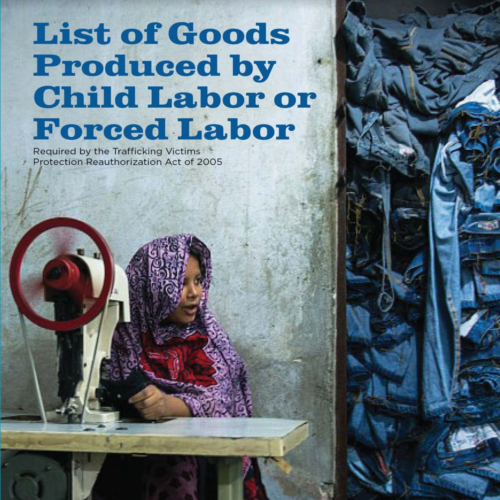 The US Department of Labor maintains a list of goods and their source countries which it believes likely to have been produced by child labour or forced labour in violation of international standards. It is not an exhaustive list and is primarily intended to raise public awareness, but is a useful starting point for considering the origins of any products bought for use by and within the hotel.
The US Department of Labor maintains a list of goods and their source countries which it believes likely to have been produced by child labour or forced labour in violation of international standards. It is not an exhaustive list and is primarily intended to raise public awareness, but is a useful starting point for considering the origins of any products bought for use by and within the hotel.Credit: US Government
-
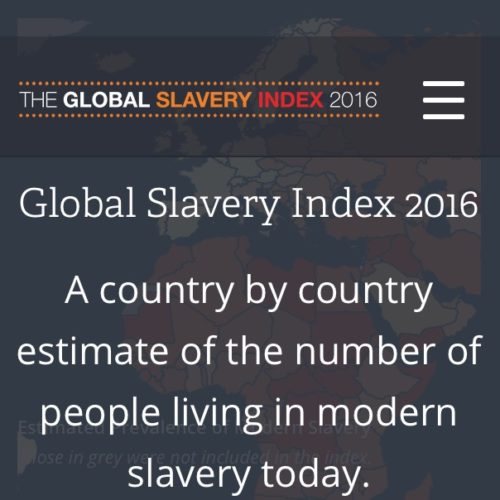 The Global Slavery Index provides a map, country by country, of the estimated prevalence of modern slavery, together with information about the steps each government has taken to respond to this issue. This information allows an objective comparison and assessment of both the problem and adequacy of the response in 167 countries.
The Global Slavery Index provides a map, country by country, of the estimated prevalence of modern slavery, together with information about the steps each government has taken to respond to this issue. This information allows an objective comparison and assessment of both the problem and adequacy of the response in 167 countries.Credit: Walk Free Foundation
-
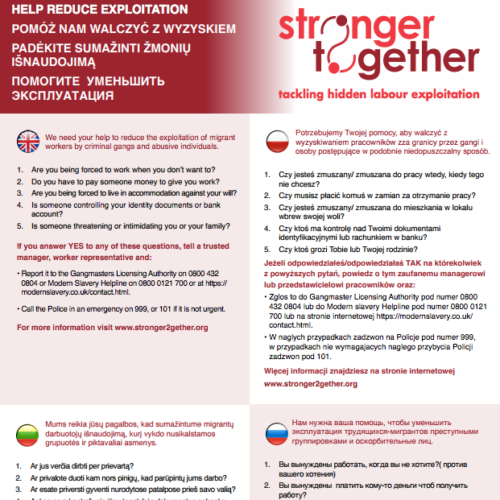 Stronger Together is a multi-stakeholder initiative which aims to reduce modern slavery. It provides guidance, training and resources to organisations, employers, labour providers, workers and their representatives. This free collection of resources includes pragmatic guidance and toolkits, and resources for the workplace including multilingual posters, leaflets and template policies. This leaflet is intended for distribution in the workplace, and asks employees five basic questions to raise awareness of exploitation and encourage those who may be unwittingly exploited to report their abuse. It is published in 8 languages.
Stronger Together is a multi-stakeholder initiative which aims to reduce modern slavery. It provides guidance, training and resources to organisations, employers, labour providers, workers and their representatives. This free collection of resources includes pragmatic guidance and toolkits, and resources for the workplace including multilingual posters, leaflets and template policies. This leaflet is intended for distribution in the workplace, and asks employees five basic questions to raise awareness of exploitation and encourage those who may be unwittingly exploited to report their abuse. It is published in 8 languages.Credit: Stronger Together
-
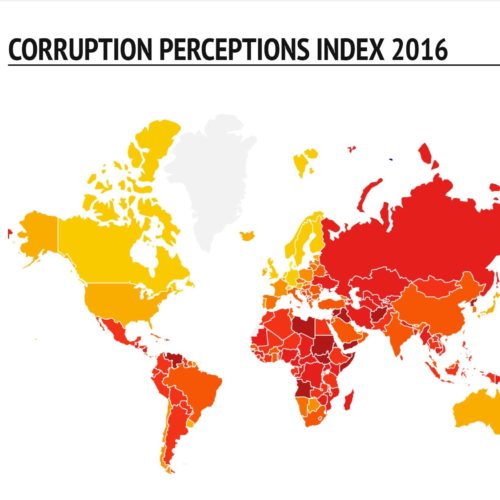 Transparency International (TI) works with governments, business and citizens to give voice to the victims and witnesses of corruption and stop the abuse of power, bribery and secret deals. TI has published the Corruption Perceptions Index since 1996, annually ranking countries by their perceived levels of corruption, as determined by expert assessments and opinion surveys. Over two-thirds of the 176 countries and territories in this year's Corruption Perceptions Index index fall below the midpoint of their scale of 0 (highly corrupt) to 100 (very clean).
Transparency International (TI) works with governments, business and citizens to give voice to the victims and witnesses of corruption and stop the abuse of power, bribery and secret deals. TI has published the Corruption Perceptions Index since 1996, annually ranking countries by their perceived levels of corruption, as determined by expert assessments and opinion surveys. Over two-thirds of the 176 countries and territories in this year's Corruption Perceptions Index index fall below the midpoint of their scale of 0 (highly corrupt) to 100 (very clean).Credit: Transparency International
-
 This report, published by the Chartered Institute of Building, calls for industry collaboration to eradicate modern slavery in supply chains, procurement and migrant labour. It offers many recommendations to companies within the industry which are also highly relevant to the hotel industry including guidance on supply chain mapping, corporate policy, training, navigating potential risks with third party agencies, and collaborating with NGOs and government.
This report, published by the Chartered Institute of Building, calls for industry collaboration to eradicate modern slavery in supply chains, procurement and migrant labour. It offers many recommendations to companies within the industry which are also highly relevant to the hotel industry including guidance on supply chain mapping, corporate policy, training, navigating potential risks with third party agencies, and collaborating with NGOs and government.Credit: Chartered Institute of Building (CIOB)
-
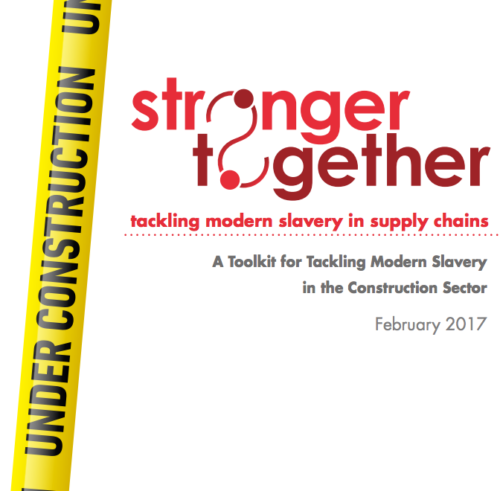 This toolkit is the result of a collaboration between the Chartered Institute of Builders and Stronger Together. It provides guidance and good practice for responsible employers and labour providers operating in the construction industry. Its aim is to support businesses set up their own policies to safeguard against human trafficking in their workforce, on sites, and in subcontracted organisations and labour providers.
This toolkit is the result of a collaboration between the Chartered Institute of Builders and Stronger Together. It provides guidance and good practice for responsible employers and labour providers operating in the construction industry. Its aim is to support businesses set up their own policies to safeguard against human trafficking in their workforce, on sites, and in subcontracted organisations and labour providers.Credit: Chartered Institute of Building (CIOB) & Stronger Together

